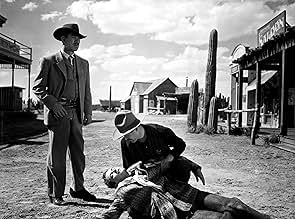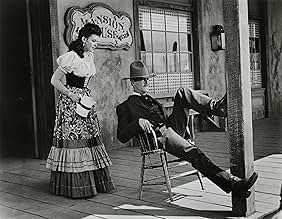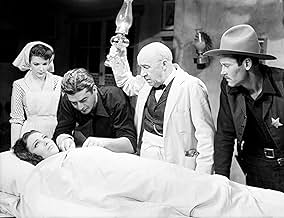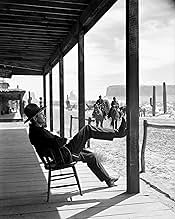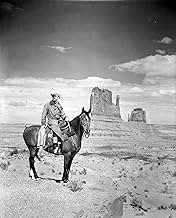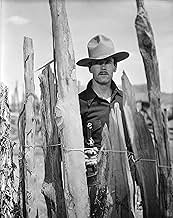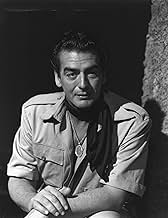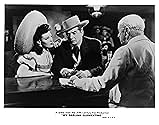NOTE IMDb
7,7/10
28 k
MA NOTE
Les Earps affrontent les Clantons à l'OK Corral situé à Tombstone, en Arizona.Les Earps affrontent les Clantons à l'OK Corral situé à Tombstone, en Arizona.Les Earps affrontent les Clantons à l'OK Corral situé à Tombstone, en Arizona.
- Réalisation
- Scénario
- Casting principal
- Récompenses
- 3 victoires au total
Robert Adler
- Stagecoach Driver
- (non crédité)
C.E. Anderson
- Townsman
- (non crédité)
Don Barclay
- Opera House Owner
- (non crédité)
Hank Bell
- Opera House Patron
- (non crédité)
Avis à la une
It's 1882. Wyatt Earp (Henry Fonda) and his brothers are driving cattle to California when they encounter Old Man Clanton who tries to buy their cattle with a low-ball offer. Wyatt kindly rejects the offer. The Earps stop at Tombstone to find a lawless town. Their cattle gets stolen and Wyatt's youngest brother James is murdered by unknown assailants. Wyatt suspects the Clantons and takes the job of town marshal. Volatile gambler Doc Holliday (Victor Mature) returns to town. Doc's past Clementine Carter (Cathy Downs) tracks him down all the way from Boston despite his refusal for her help. Doc's present day friend Chihuahua (Linda Darnell) is not happy with her presence.
I really love the start and Henry Fonda can do no wrong especially as a stoic heroic lead. I have a bit of an issue with Victor Mature. I can't forget Val Kilmer playing the role who is so much more fun. Mature is more angry than sickly. As for the iconic shootout, again I really love the start. Monument Valley looks epic in the background. I love the slow walk up to the OK Corral. Then the action isn't quite as epic. Director John Ford would say that he extended it from a 30 seconds fight but it doesn't really measure up to modern action scenes. All in all, this is a classic for its time.
I really love the start and Henry Fonda can do no wrong especially as a stoic heroic lead. I have a bit of an issue with Victor Mature. I can't forget Val Kilmer playing the role who is so much more fun. Mature is more angry than sickly. As for the iconic shootout, again I really love the start. Monument Valley looks epic in the background. I love the slow walk up to the OK Corral. Then the action isn't quite as epic. Director John Ford would say that he extended it from a 30 seconds fight but it doesn't really measure up to modern action scenes. All in all, this is a classic for its time.
Set amid the sweeping vistas and the towering sandstone buttes and spires of Monument Valley, this John Ford film, about Wyatt Earp (Henry Fonda) and his encounters with the Clanton gang in rowdy Tombstone, Arizona, fulfills our need to experience the Old West as mythic romanticism. The visuals are striking. El Greco skies oppress a majestic and lonesome landscape of rock, dirt, dust, and cattle. Ghostly human figures confront death in heavy rain. Indoors, small, overhead lanterns emit soft light in tough barrooms. The B&W cinematography conveys a somber, moody, idealized vision of the nineteenth century American frontier.
But the film's romanticism is not just the product of adroit cinematography. The relaxed narrative weaves multiple, seemingly insignificant plot lines into a unified whole, and thus depicts the Old West as a place and time of humor, wit, religious faith, amiable conflict, even poetry and philosophy.
And so, in his heartfelt soliloquy of "the undiscovered country", Granville Thorndyke (Alan Mowbray), that congenial thespian rogue who quotes Shakespeare and who seems so out of place, adds texture and soul to the script, as a precursor to violence and death. This is after all ... Tombstone.
Inspired by the real life gunfight at the OK Corral, the story is less factual than suggestive. It's not just the film's fanciful portrayal of the shootout that abets credulity. It's the setting ... Tombstone is nowhere near Monument Valley.
But this is not a textbook. It is a romanticized cinematic interpretation of a long-ago culture, using a textbook incident as a premise. The film's theme centers on the nobility of outcasts and the basic goodness and humanism of frontier people. It's a broad-brush character study of historical figures like Doc Holliday (Victor Mature), Old Man Clanton (Walter Brennan), the Clanton sons, and of course Wyatt Earp and his sons. Although one could argue that Fonda lacks the tough guy strength and roughness that we would expect for a frontier legend, the casting and the acting are overall quite good. Editing, costumes, and production design also enhance the film's credibility.
Understated and meditative in tone, "My Darling Clementine" is a different kind of Hollywood western, one that conveys a humanistic theme with emotional depth. Characters are multi-dimensional, unvarnished, and as striking and memorable as the stately buttes and spires of Monument Valley.
But the film's romanticism is not just the product of adroit cinematography. The relaxed narrative weaves multiple, seemingly insignificant plot lines into a unified whole, and thus depicts the Old West as a place and time of humor, wit, religious faith, amiable conflict, even poetry and philosophy.
And so, in his heartfelt soliloquy of "the undiscovered country", Granville Thorndyke (Alan Mowbray), that congenial thespian rogue who quotes Shakespeare and who seems so out of place, adds texture and soul to the script, as a precursor to violence and death. This is after all ... Tombstone.
Inspired by the real life gunfight at the OK Corral, the story is less factual than suggestive. It's not just the film's fanciful portrayal of the shootout that abets credulity. It's the setting ... Tombstone is nowhere near Monument Valley.
But this is not a textbook. It is a romanticized cinematic interpretation of a long-ago culture, using a textbook incident as a premise. The film's theme centers on the nobility of outcasts and the basic goodness and humanism of frontier people. It's a broad-brush character study of historical figures like Doc Holliday (Victor Mature), Old Man Clanton (Walter Brennan), the Clanton sons, and of course Wyatt Earp and his sons. Although one could argue that Fonda lacks the tough guy strength and roughness that we would expect for a frontier legend, the casting and the acting are overall quite good. Editing, costumes, and production design also enhance the film's credibility.
Understated and meditative in tone, "My Darling Clementine" is a different kind of Hollywood western, one that conveys a humanistic theme with emotional depth. Characters are multi-dimensional, unvarnished, and as striking and memorable as the stately buttes and spires of Monument Valley.
On M*A*S*H Colonel Potter says this movie is great because it has "horses, cowboys and horses". That's a funny joke but "My Darling Clementine" is great because a lot more reasons than that. It's a beautiful movie to look at. It's funny, sad, suspenseful. It's a surprisingly quiet film. John Ford strikes the perfect balance between all of those elements. The cast is great, although I wish Ward Bond had more to do. I haven't watched "My Darling Clementine" in quite a while. Shame on me. I won't let that happen again.
10rmears1
Absolute perfection. Without a doubt, `My Darling Clementine' has secured its place in film immortality, resting proudly at the top of the list of the finest westerns ever made. It represents the genre at its peak and the career high point of all involved, including director John Ford and star Henry Fonda. `Clementine' achieves the difficult blend of drama, action, romance and occasional comic relief necessary to appeal to all viewers. This is the kind of film at which Ford excelled - straightforward and powerful, sentimental but never maudlin. It is needless to say that this is the definitive portrayal of Wyatt Earp and the gunfight at the OK Corral. It may not be the grittiest, most penetrating or historically accurate rendition, but it mixes just the right quantities of realism, legend and Hollywood magic. Its characterizations leave no room for improvement. Henry Fonda was born to play Earp. His folksy, unpretentious demeanor, coupled with the hard edge of a man who must occasionally deal out justice through the barrel of his gun, produce a multidimensional performance that others approaching the role could only dream of. With his portrayal of the tubercular Doc Holliday, Victor Mature forever shed his light image and began a series of solid dramatic roles. Other actors have played Holliday as flamboyant and eccentric, but Mature is effective in approaching him as a fatalist who has relinquished his aspirations of greatness and now lives life one day at a time. He forms an alliance with Earp because he has nothing better to do, and nothing else to live for. Walter Brennan's Old Man Clanton is a study in evil personified, and will certainly shock viewers who know him only as the crotchety but lovable grandfather he played on so many occasions. The rest of the cast is uniformly fine, featuring many members of Ford's `stock company' which followed him throughout his career. Ford's direction is strong and sure-footed. Although this was familiar territory for him, he was careful to instill each scene with a certain degree of uniqueness so the film would never appear routine. In this he was entirely successful, and a brief glance at his filmography confirms that this holds true throughout his body of work. The cinematography is breathtaking. Vast outdoor imagery and intimate gatherings of people are conveyed in an equally compelling manner. Earp's soliloquy at his brother's gravestone, a church dance sequence and the gunfight itself are among the film's many highlights. Only so much praise can be given in a review such as this; it must be seen to be appreciated.
I'm not a huge fan of westerns, but the info on this from IMDb drew me
to watch it when it showed up on American Movie Classics, and I was
richly rewarded. This is truly a beautifully done film, and makes one
understand John Ford's reputation in this genre. The understated Henry
Fonda and the volcanic Victor Mature somehow work well against each
other. The script is low-key and naturalistic, allowing the action to
stand out. The cinematography is spectacular, both in the wide open
panoramas and in the more intimate personal scenes. Interior lighting,
in particular, is very skillfully used. Seeing Walter Brennan playing
against type, makes one appreciate how much better an actor he was than
in the amiable, doddering bumpkin roles he got so typecast in later on.
To use an overworked term, a classic.
To use an overworked term, a classic.
Le saviez-vous
- AnecdotesJohn Ford was asked by a film historian why he changed the historical details of the famous gunfight if, as he claimed, the real Wyatt Earp had told him all about it on a movie set back in the 1920s. "Did you like the film?" Ford asked, to which the scholar replied it was one of his favorites. "What more do you want?" Ford snapped.
- GaffesThe movie shows James Earp killed (murdered) with his marker showing "born 1864 died 1882". However, James Earp was, in fact, born in 1841 and died in 1926 of natural causes. It was Morgan Earp who was murdered on 18 March 1882.
- Citations
Wyatt Earp: Mac, you ever been in love?
Mac: No, I've been a bartender all me life.
- Crédits fousThe opening credits appear to be etched into nine wooden boards (like signs) nailed to a post. The camera pans down as the post rotates 90 degrees back and forth for each board.
- Versions alternativesIn 1994, an alternate "preview" version of the film was found that runs 103 or 104 minutes, according to different sources. In June 1946, director John Ford showed producer Darryl F. Zanuck his cut of the film. Zanuck's opinion was that the film had some problems, so Zanuck reshot certain scenes with Director Lloyd Bacon. Zanuck also recut other scenes, changed the music at certain points, and slightly altered the finale. In all, 35 minutes of footage was shot or recut, and the film was released at 97 minutes. Both the 103-104 min. archival preview print and the 97 min. release print are on the Fox DVD released January 6, 2004.
- ConnexionsEdited into John Ford, l'homme qui inventa l'Amérique (2019)
- Bandes originales(Oh My Darlin') Clementine
(1884) (uncredited)
Music by Percy Montrose
Lyrics by H.S. Thompson
Played and Sung during the opening credits and at the end
Also Whistled by Henry Fonda entering the hotel lobby on Sunday morning; stops whistling when he sees Clementine
Meilleurs choix
Connectez-vous pour évaluer et suivre la liste de favoris afin de recevoir des recommandations personnalisées
- How long is My Darling Clementine?Alimenté par Alexa
Détails
Box-office
- Budget
- 2 000 000 $US (estimé)
- Montant brut mondial
- 16 432 $US
- Durée
- 1h 37min(97 min)
- Couleur
- Rapport de forme
- 1.37 : 1
Contribuer à cette page
Suggérer une modification ou ajouter du contenu manquant


